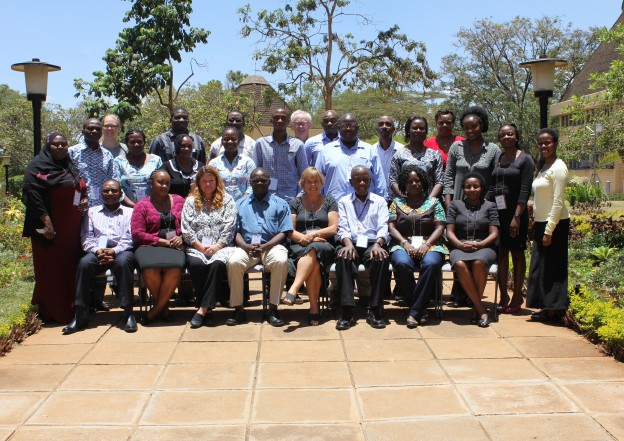AIFSRC supports eight participants at the Crawford Fund Communications Master Class
In mid-March, the Food Security Centre supported eight participants from AIFSRC projects to attend the Crawford Fund Master Class in Communicating Research to Stakeholders in Nairobi. The workshop was held at the International Centre for Insect Physiology and Ecology (ICIPE) and was run by Jenni Metcalfe from Econnect and Toss Gascoigne from Toss Gascoigne and Associates.
Twenty-three participants from 11 countries came together to learn about communicating research to stakeholders, to teach each other about their experiences, and to share knowledge on agricultural research.
Source: Elise Crabb, ACIAR
The workshop was a great opportunity for participants to:
- Meet fellow agricultural researchers and science communicators from the Africa region
- Identify different stakeholders and how to best communicate with each of them
- Learn how to improve their own communications to stakeholders using presentations, media and print
The workshop was divided into the following broad sessions:
- Day 1 - communications planning and a stakeholder panel
- Day 2 - social media
- Day 3 - presentation skills
- Day 4 - communication planning and writing skills
- Day 5 - media skills with a journalist panel
The workshop included special sessions with expert panels. Day 1 consisted of a stakeholder panel with the Director of Research and Partnerships of ICIPE, an Australian Government Aid Policy representative, and member of the Kenyan Small Scale Farmer Forum. The panel discussed with participants the perceptions, needs and concerns of different stakeholder groups including farmers, researchers and funders.
Source: Elise Crabb, ACIAR. L-R: Toss Gascoigne, Dr Chris Prideau (ICIPE), Anna Dorney (DFAT), Justus Lavie (Kenyan Small Scale Farmer Forum)
On Day 4, the Food Security Centre participants met with Liz Ogutu (AIFSRC and ACIAR Regional Manager for Africa) and Elise Crabb (Communications Officer of ACIAR) to discuss the communications needs of the AIFSRC, the Nairobi ACIAR office, the Canberra ACIAR office and the communications needs of AIFSRC projects.
Liz and Elise presented on the relationship between the AIFSRC and ACIAR, the Food Security Centre’s current activities and dashboard, the available resources and channels for projects to communicate to stakeholders, the AIFSRC and ACIAR communication channels that can be tapped into to share project updates and news, and information about the Australian Government’s branding guidelines for project publications. The group discussed the best way to exchange project news and information both ways – which focused on the use of emails and social media to connect.
On the final day of the workshop, a journalist stakeholder panel consisting of agricultural science journalists provided insight into what journalists want in a story and what they seek from researchers who are trying to promote and share their projects through the media. The panel consisted of television, radio, and print media journalists from Nairobi. Workshop participants were filmed while being interviewed by a television presenter, they were recorded while talking to a radio journalist, and were questioned by print journalists to get a feel for the questions and approach the media uses when talking to scientists about their research.
The key take-away message participants took with them was to make their key point first in their article or interview so that it grabs the audience’s attention straight away. In addition, audiences want to know how the research will benefit them or their families, so this needs to be highlighted strongly and early on in the interview or article.
Source: Elise Crabb, ACIAR. L-R Toss Gascoigne, Jane and Koros
Throughout the week, the group developed communications strategies for their top three stakeholder groups – this involved identifying the needs, perceptions, messages and channels to best communicate with stakeholders. For many participants who work with farmers, they recognised the difficulties due to time, resource and media coverage in rural areas, so what may work in the city may not work for farmers out in the field.
The second part of the plan was to implement action strategies for the next 3 to 6 months, to ensure the plans are implemented and actually lead to improved communications results that will benefit farmers, research institutions, governments, funding donors and participant organisations. These plans set the groundwork for participants to work on and continue using the knowledge from the course and to share within their own organisations.
Source: Elise Crabb, ACIAR. L – R: Thabani Dube (ICRISAT), Dr Segenet Kelemu (ICIPE), John Feakes (Australian High Commissioner)
Throughout the week, the vibe of the group was very positive – there was encouragement, constructive feedback and praise for great presentations, projects and discussions from all participants as they engaged in the workshop. The workshop ended on a high note with a celebratory ceremony with the Australian High Commissioner of Kenya, John Feakes and Director General of ICIPE, Dr Segenet Kelemu presenting certificates to all participants for their hard work and completion of the course.
By Elise Crabb, External Engagement and Media Presence Officer, ACIAR

